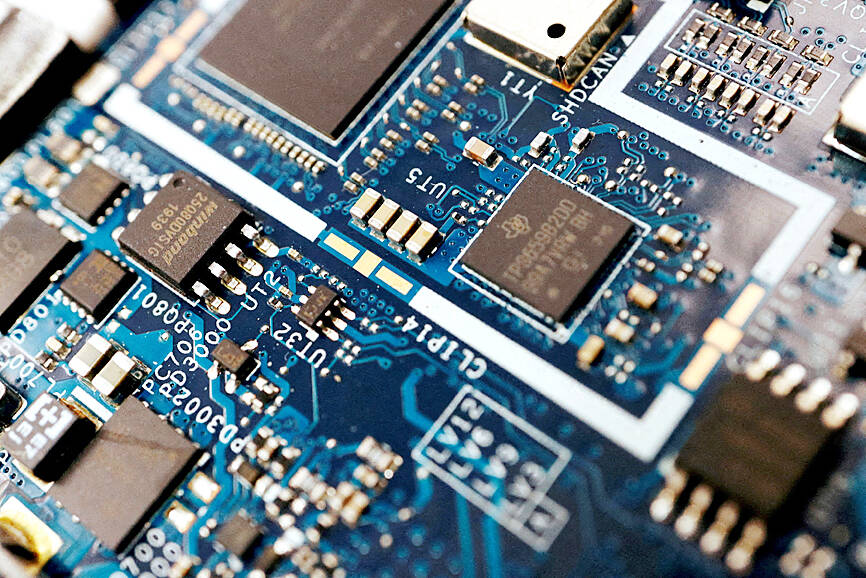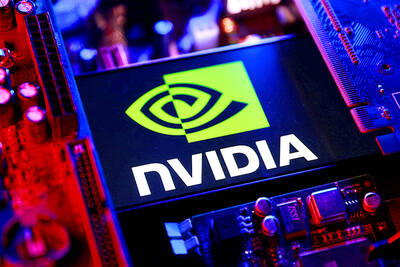Sweeping tax legislation passed by the US Senate on Tuesday would make it cheaper for semiconductor manufacturers to build plants in the US, delivering a win to chipmakers and boosting US efforts to expand the industry domestically.
Companies such as Intel Corp, Taiwan Semiconductor Manufacturing Co (TSMC, 台積電) and Micron Technology Inc would be eligible for an investment tax credit of 35 percent if they break ground on new plants before a deadline next year. That is a jump from the existing 25 percent and tops an increase to 30 percent envisioned in a draft proposal.
The semiconductor manufacturing provision was tucked into a nearly 900-page bill that represents the heart of US President Donald Trump’s economic agenda.

Photo: Reuters
US House of Representatives lawmakers are set to take up the legislation with a goal of sending it to Trump for his signature by tomorrow.
Increases to the credit would sweeten a key incentive created under the 2022 CHIPS and Science Act, a bipartisan law signed by former US president Joe Biden. The program also includes US$39 billion in grants and as much as US$75 billion in loans for manufacturing projects, designed to boost the US semiconductor industry after decades of production shifting to Asia.
The tax credit, which is not capped, was already likely to be costlier than those other forms of subsidies — a function of how much investment the CHIPS Act has spurred. In almost every case, it would account for the greatest share of incentives going to any one company, including those that did not win grant awards. Major beneficiaries of the grant program include Intel, TSMC, Micron and Samsung Electronics Co.
Trump earlier this year called for repealing the CHIPS Act, but US lawmakers have shown little desire to eliminate subsidies that provide high-paying jobs in their districts, in a sector seen as critical to national security. Meanwhile, the US Department of Commerce has continued to implement the grant program — while urging larger investments and reworking terms of awards that took months to negotiate.
So far, the Trump administration has secured increases in promised investment from TSMC, Micron and GlobalFoundries Inc — which the White House has touted as evidence that Trump’s policies are working. None of those included additional CHIPS Act grants beyond what had already been finalized or proposed. Still, more company spending on projects very likely means more foregone government revenue in the form of tax credits — a number that would grow if the US Senate bill becomes law.
Companies that commence projects by the end of next year could continue to claim credits for continuous construction after that date — a policy aimed at getting sites started while recognizing that chip factories take years to build.

POWERING UP: PSUs for AI servers made up about 50% of Delta’s total server PSU revenue during the first three quarters of last year, the company said Power supply and electronic components maker Delta Electronics Inc (台達電) reported record-high revenue of NT$161.61 billion (US$5.11 billion) for last quarter and said it remains positive about this quarter. Last quarter’s figure was up 7.6 percent from the previous quarter and 41.51 percent higher than a year earlier, and largely in line with Yuanta Securities Investment Consulting Co’s (元大投顧) forecast of NT$160 billion. Delta’s annual revenue last year rose 31.76 percent year-on-year to NT$554.89 billion, also a record high for the company. Its strong performance reflected continued demand for high-performance power solutions and advanced liquid-cooling products used in artificial intelligence (AI) data centers,

SIZE MATTERS: TSMC started phasing out 8-inch wafer production last year, while Samsung is more aggressively retiring 8-inch capacity, TrendForce said Chipmakers are expected to raise prices of 8-inch wafers by up to 20 percent this year on concern over supply constraints as major contract chipmakers Taiwan Semiconductor Manufacturing Co (TSMC, 台積電) and Samsung Electronics Co gradually retire less advanced wafer capacity, TrendForce Corp (集邦科技) said yesterday. It is the first significant across-the-board price hike since a global semiconductor correction in 2023, the Taipei-based market researcher said in a report. Global 8-inch wafer capacity slid 0.3 percent year-on-year last year, although 8-inch wafer prices still hovered at relatively stable levels throughout the year, TrendForce said. The downward trend is expected to continue this year,

A proposed billionaires’ tax in California has ignited a political uproar in Silicon Valley, with tech titans threatening to leave the state while California Governor Gavin Newsom of the Democratic Party maneuvers to defeat a levy that he fears would lead to an exodus of wealth. A technology mecca, California has more billionaires than any other US state — a few hundred, by some estimates. About half its personal income tax revenue, a financial backbone in the nearly US$350 billion budget, comes from the top 1 percent of earners. A large healthcare union is attempting to place a proposal before

‘BASICALLY A BAN’: Sources said the wording governing H200 imports from officials was severe, but added that the regulations might change if the situation evolves Chinese customs authorities told customs agents this week that Nvidia Corp’s H200 artificial intelligence (AI) chips are not permitted to enter China, three people briefed on the matter said. Chinese government officials also summoned domestic technology companies to meetings on Tuesday, at which they were explicitly instructed not to purchase the chips unless necessary, two of the people and a third source said. “The wording from the officials is so severe that it is basically a ban for now, though this might change in the future should things evolve,” one of the people said. The H200, Nvidia’s second-most powerful AI chip, is one